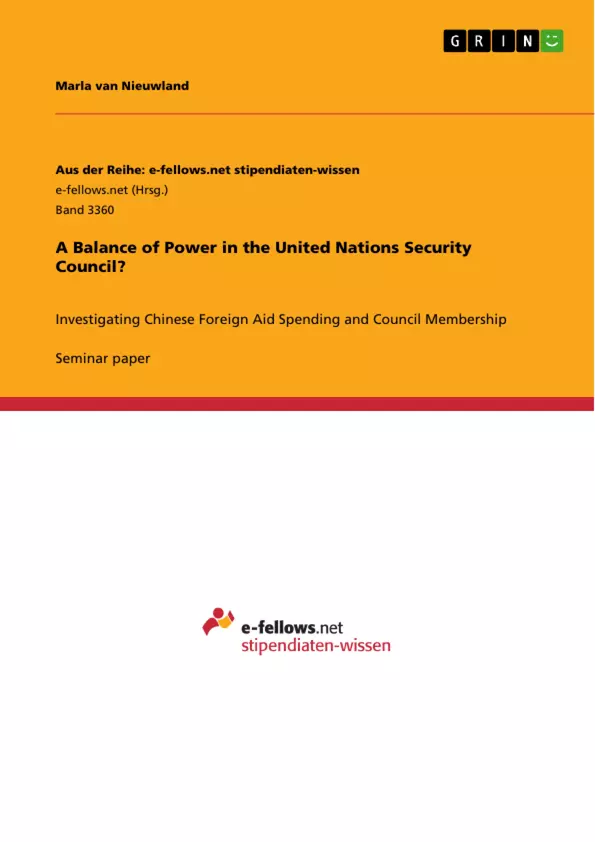Does China challenge US dominance in the UNSC by increasing foreign aid for non-permanent members? This research question will be the focus of the paper. With a look at Chinese spending on foreign aid the assumption of buying support does not seem far-fetched. Chinese foreign aid could potentially be even more effective than US aid in strategically buying support in the UNSC, because it comes without any strings attached and gives state leaders more freedom to decide over the allocation of resources.
According to the realist school of thought, international politics are power politics and states constantly work to increase their power – be it economic or military power – relative to each other. And although the United States can be seen as a hegemon since the end of the cold war, unipolarity is regarded by realists as the least durable of all power configurations. China is almost caught up to the United States in terms of military spending and economic growth, the population is three times that of the US and China can already be seen as a regional hegemon in Asia.
However, even though China has become more aggressive and vocal in global politics since Xi Jinping’s shift away from the “hide and bid policy” and scholars have indeed observed subtle strategies of Beijing challenging and resisting the authority of the hegemon, it remains understudied, if China also attempts to challenge US dominance in the UNSC. If the expectation of a balance of power by realists were true though, we might expect China not to let the US dominate – especially in a critical area such as international security politics – the decisions of the UNSC by strategically buying votes or support with foreign aid.
Inhaltsverzeichnis (Table of Contents)
- Introduction
- Literature Review
- Theory
- Research Design
- Findings
- Discussion
- Limitations
- Conclusion
Zielsetzung und Themenschwerpunkte (Objectives and Key Themes)
This paper investigates whether China, similar to the United States, uses foreign aid as a tool to influence voting patterns in the United Nations Security Council (UNSC). Specifically, the study explores whether China increases foreign aid to countries becoming non-permanent members of the UNSC, aiming to secure their support.
- China's foreign aid strategy in the UNSC
- The influence of foreign aid on voting patterns
- The role of China in global power politics
- The balance of power between China and the United States
- The realist expectation of a balance of power
Zusammenfassung der Kapitel (Chapter Summaries)
- Introduction: The paper introduces the research question, highlighting the US's practice of using foreign aid to influence voting patterns in the UN and examining whether China follows a similar strategy. The study aims to assess whether China's foreign aid spending increases for countries becoming non-permanent members of the UNSC.
- Literature Review: This chapter discusses existing research on the relationship between foreign aid and voting patterns in the UN, particularly focusing on the US's use of aid to secure support. It also examines whether other permanent members of the UNSC, particularly G7 nations, engage in similar practices.
- Theory: This chapter presents the theoretical framework underpinning the study, drawing upon realist theories of international relations and the concept of balance of power to explain China's potential interest in securing support in the UNSC.
- Research Design: This section details the methodology used in the study, outlining the linear regression model employed to analyze the relationship between Chinese foreign aid and UNSC membership.
Schlüsselwörter (Keywords)
The paper focuses on the following key terms and concepts: Chinese foreign aid, United Nations Security Council, vote buying, balance of power, realism, international politics, UNSC membership, foreign aid spending, and strategic diplomacy.
Frequently Asked Questions
What is the main research question of this paper?
The research focuses on whether China challenges US dominance in the United Nations Security Council (UNSC) by increasing foreign aid to non-permanent members to buy their support.
Why might Chinese foreign aid be more effective than US aid?
The paper suggests Chinese aid might be more effective because it often comes without "strings attached," giving state leaders more freedom in how they allocate resources.
Which theoretical framework is used to analyze China's behavior?
The study uses the realist school of thought, which views international politics as power politics where states constantly work to increase their relative power.
What is the "hide and bid policy" mentioned in the abstract?
It refers to China's previous diplomatic strategy, which shifted under Xi Jinping toward a more aggressive and vocal role in global politics.
What methodology does the research design employ?
The study uses a linear regression model to analyze the relationship between Chinese foreign aid spending and UNSC membership of recipient countries.
- Quote paper
- Marla van Nieuwland (Author), 2019, A Balance of Power in the United Nations Security Council?, Munich, GRIN Verlag, https://www.grin.com/document/534862



